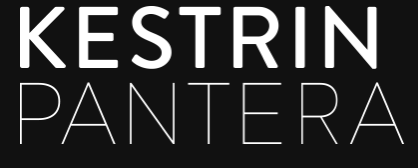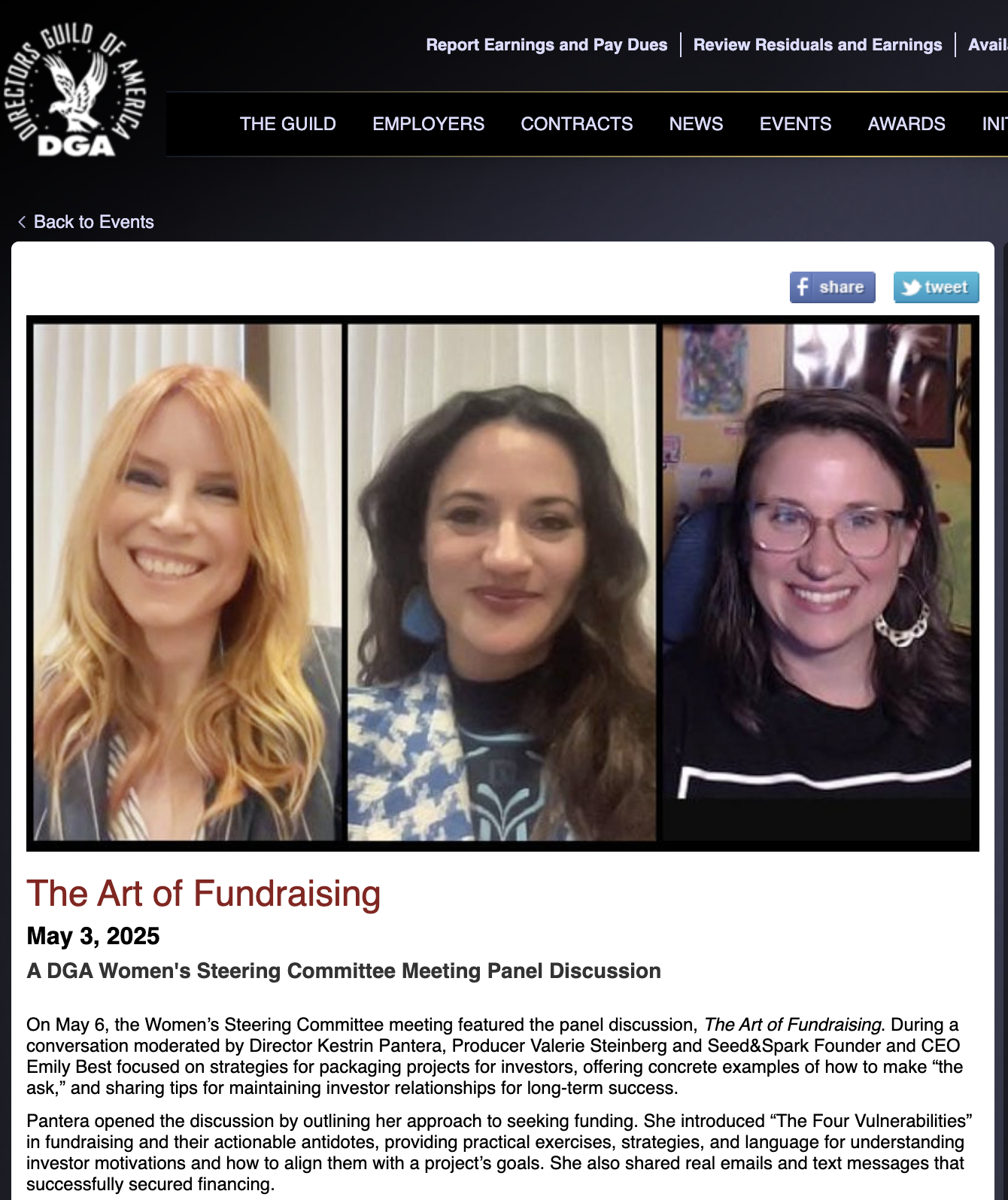Sorceress Ventures is the Angel investing vehicle of Kestrin Pantera. She is a DGA Director and Co-Chair of the DGA Women’s Steering Committee A&E Team, and directs feature films and commercials, when she is not investing in tech startups.
Notable investments for Sorceress Ventures include being the first check and advisor in health AI company, which immediately raised a $4 million in pre-seed follow-on funding.
Beyond her work with Sorceress Ventures, she works with the Pasadena Angels, who have invested over $95 million in 240 companies. With the Pasadena Angels, she led several deal rounds and closed funding for companies with co-investment from Meta. On the Pasadena Angels Marketing Committee, she rebranded the Pasadena Angels logo and website for the first time in 25 years.
She's looking for companies with a big market opportunity ($1b+) and an extraordinary team with technical skills, in market sectors that she and her partner understand, like film, entertainment, marketplaces, gov tech, climate, clean transportation, SAAS, and truly innovative consumer mobile apps.
The Art of Fundraising
Fundraising is a core part of her work and a passion she actively teaches—especially to women and filmmakers navigating financing and investor alignment. Presented at the DGA and top film-school fellowships, The Art of Fundraising equips filmmakers with practical tools and language to make “the ask” effectively. The talk demystifies financing and helps creatives pursue support without compromising their values. You may encounter this conversation in select talks and workshops.
Read Pasadena Angels member profile on Kestrin, in which she shared her journey to becoming an Angel investor.
PASADENA ANGELS MEMBER PROFILE:
(September Pasadena Angels Newsletter, 2025 by Jim Kee)
Kestrin Pantera - From Karaoke Bus to Cap Tables
A fellow expat in Taipei asked Kestrin Pantera a question that jump-started her entire life: “What do you want to do -- for real?”
Because every expat knows that moving abroad in your twenties is a form of avoiding responsibility – this “for real” was loaded.
Kestrin had moved to Taiwan right after graduating from Wake Forest University with the equivalent of a first-year MBA from WFU’s Summer Business Management Program. China had recently joined the WTO and she didn’t know what she wanted to do, “for real,” yet, but figured if she learned to speak Mandarin fluently, she’d be employable for life. After buying a one-way ticket to Taiwan and living there for a year, her goal had been achieved: she’d mastered Mandarin and used it to negotiate her own deals and become one of the leading voiceover artists in Taiwan. And now, the big question was inescapable.
Without hesitation, Kestrin replied: "I want to make movies."
“How do you do that?” her friend asked.
“I guess you have to move to Los Angeles.”
As soon as she heard herself say it, she knew. “The crystal cracked," Kestrin told me. That moment of clarity in Taiwan led her to Los Angeles, to filmmaking, to a karaoke RV (“The RVIP Lounge”) and ultimately to leading a $4 million funding round as a Pasadena Angels member - not all at once, but usually at least two at a time.
Kestrin's story started in rural California - "literally the highest teen pregnancy, highest crystal meth county in California" - before moving to a fancy boarding school at 13. "It was kind of like going to Hogwarts.” Learning to navigate between small-town grit and elite privilege would become one of her defining superpowers, a skill she carried into every chapter that followed.
The RV That Changed Silicon Valley Marketing
By the late 2000s, Kestrin was working with promising directors in Hollywood. She and her then-boyfriend (now husband) decided to throw a party at South by Southwest Interactive (the tech conference) only five days before the event. Everything was booked, so they rented an RV, slept in it, slapped a banner on the outside, and threw karaoke parties inside it. They christened it “The RVIP Lounge: where everyone is a VIP.”
Their guerrilla marketing tactics were accidentally brilliant. While other companies hemorrhaged a quarter million dollars on official parties, Kestrin and her team spent about $5,000 for a week and scooped up heavy hitters and coveted talent from the Google and Facebook parties with lines around the block. They'd park the RVIP outside, roll out a red carpet, throw up lights, and "make a scene and then drive away with the best people." They got more marketing impressions than the massively budgeted events the RVIP drove past.
Fortune 500 companies came calling, asking to sponsor the RVIP to do the exact roving karaoke event for massive global organizations. "We gave them guidance, explained the run of show and approved their designs- as opposed to the other way around," Kestrin says. Andreessen Horowitz and Foursquare sponsored their second year. Intel, Google, Hershey's, and Coca-Cola all sponsored shortly thereafter, “We worked with the biggest website, the biggest soft drink, and biggest chocolate companies in the world.” She had a successful 10 year partnership with WIRED/Conde Nast that brought even more world-class companies her way.
Tech startups launched regularly at their events. "I've seen so many product demos at three in the morning from world-class engineers," she remembered. The RVIP Lounge was the first commercial entity to use Twitter for location marketing ("meet at this place" was the only way to find them). She watched people launch, hire and close big contracts from the front row.
"Every single time we throw a party, we overhear a stranger say, 'This is the greatest night of my entire life,'" Kestrin explains. That community-building magic - creating spaces where unexpected connections happen - is one of her other superpowers.
From Entertainment to Investment Thesis
A good portion of Kestrin’s time has also been devoted to writing, directing and acting in dozens of films in the last fifteen years. "Every film is basically a startup. You go through the exact same things," she explained. Create an LLC, structure deal terms, raise equity from investors, and evaluate your team with a crucial question: "Do I want to be with this person on the worst (or best) day of my life, at 3am?"
Her "agile filmmaking" approach borrowed heavily from startup methodology. She developed what she calls the "gauntlet of pain" - an editing process where she'd watch a cut, make a spreadsheet of notes, work until three or four in the morning, hand it off to an editor to work all day and export at 5pm, and screen it again at 8pm. "We do that five nights in a row, and by Friday, usually nothing makes me want to throw up anymore,” which allows her to relax, because, “I guess we got a movie."
This urgency and efficiency lens carries directly into her startup evaluation. "I look for people who can find ways of optimizing capital deployment smartly and efficiently," she says. Just like in filmmaking, if someone gives you $5 million, it better look like at least $10 million onscreen.
The Burning Man Epiphany
Kestrin's path to angel investing started during a drive to Burning Man with a friend who scouted for Sequoia Capital. Her friend wasn't what Kestrin expected an investor to look like - "I thought investors looked like Bob Dole," she admits. This young, successful woman had sold a company to Twitter and direct reported to Elon Musk. As she spoke about the companies she invested in for Sequoia, she followed up with another life-changing question:
"Do you invest?"
"Well, I have, I mean... my husband and I…," Kestrin stammered, and then realized. "That was the moment… I was like: ‘I am starting investing now.’"
The next month, Kestrin went to a children's birthday party in Pasadena. During a conversation with another parent about angel investing, she confidently declared, "I'm getting into angel investing." The other parent turned out to be Pasadena Angels’ Bob Gingrich. He handed her a business card and invited her to the October meeting.
Investment Philosophy in Action
Today, Kestrin focuses on AI companies with "extraordinary teams" that build products she believes "must exist." She recently led a $4 million round for a health tech company; they're now raising $7-20 million with an actual product. "I knew the team extremely well. I believe they are a billion-dollar team," she says.
She has spent a lot of time working closely with machine learning engineers. "I get to kick around with the smartest people in the world, and that's really what brings me joy," she notes. "In entertainment, it's about hanging out with the funniest, most charismatic person. But in tech, it's all about the smartest."
Her investment criteria reflects her filmmaking background: "Does this person have the vision? Am I inspired when they talk? Do they have the capacity to make me get excited?" She looks for founders who can energize everyone around them.
Pattern Recognition Magic
The thread connecting all her ventures has been building communities where magic happens. She did it in the RVIP Lounge where tech executives sang duets with ML engineers, and she does it on sets and in editing rooms. Sometimes the most unconventional paths create standout innovators and investors. Maybe they can recognize patterns that traditional finance backgrounds don’t. Maybe they can tell when the magic is happening.
She readily admits that there’s a lot of luck involved, but her story is a clear example of luck favoring those who create spaces for serendipity.
Entrepreneurs: Apply for Pasadena Angels funding
Investors: Join Pasadena Angels as a Member
Coming Soon



